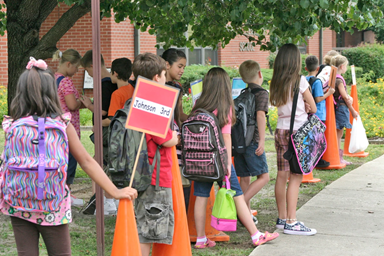By Jenny Rea, Ph.D.
It’s that time of year again! As a new school year approaches, families prepare their children for the back-to-school transition. Whether it be to a new school or a school they have previously attended, emotions of fear, anxiety and excitement are heightened. While this year looks a bit different then the years before (see part 2 of this blog series for the impacts of COVID-19 on the back-to-school transition ), the end goal is the same – ensure that children are ready for academic success.
The transition back to school for military kids can be a bit different as well. Military children are sometimes faced with many more challenges than the typical child due to frequent changes of location. The average military child will move 6 to 9 times during their school career, an average of 3 times more frequently than non-military families (Ruff & Kiem, 2014). While military kids are amazingly resilient, it’s normal for them to have concern for the unknowns and the changes that are brought on by every new school year.
As military family service professionals (MFSPs), we can help military families as their children transition back to school. Below are 5 things to lessen the burden for military kids and help their families ensure an easy back-to-school transition.
-
- Be involved in a child’s education – Things like reading books to kids, sitting with them while they are doing their homework, or providing educational tools and crafts at home are great ways for military families to be involved in their child’s education.
- Establish new routines at home – If families don’t have a set routine already, it may be beneficial to develop a schedule that includes meal and bedtimes, for example.
- Find a buddy! – In many military-connected schools, new military students can be paired with another student or a “buddy” to help them adjust to the new school.
- List special needs and get additional support – For families with children who have special needs (academic, emotional, mental, physical, etc.), it’s essential that they share these needs with the teacher. Caregivers should also reach out for additional support if these needs are not being met.
- Seek opportunities to meet educators – Most schools offer open houses for children to meet their teachers before school starts. If the military child is overly anxious, encourage the family to reach out to the educator to set up a private time to visit the school.
Reminder for guardians & parents: If your family has recently PCS’d (permanent change of duty station), don’t forget to bring along copies of academic records that may not have arrived yet to school. This also includes vaccination records.
ADDITIONAL MATERIALS
1. Back to school 2021 – Getting Ready for Virtually Anything
2. Back-to-School Planning During COVID-19
3. 5 Back-to-School Resources for Military Kids
4. Resource Directory: Military Child Education Coalition
5. A New Adventure for our Military Kids
This post was written by Jenny Rea, Ph.D., military spouse, and mom of four kiddos under four years. Jenny consults with the OneOp Family Transitions team to support professional development for military family service providers. You may find more blogs, podcasts, and webinars from Family Transitions. We invite you to engage with Family Transitions on Twitter @MFLNFT and with OneOp on Facebook @MilitaryFamilies.
REFERENCES
Ruff, S. B., & Keim, M. A. (2014). Revolving doors: The impact of multiple school transitions on military children. Professional Counselor, 4(2), 103-113.
Writers Biography
 Jenny Rea, Ph.D., is a military spouse and mom of four kiddos under six years. Jenny consults with OneOp and is an Assistant Professor of Practice in the Department of Human Services and Director of the Certificate in Military Families at the University of Arizona.
Jenny Rea, Ph.D., is a military spouse and mom of four kiddos under six years. Jenny consults with OneOp and is an Assistant Professor of Practice in the Department of Human Services and Director of the Certificate in Military Families at the University of Arizona.
Photo Source: Courtesy of Military Times 2020















